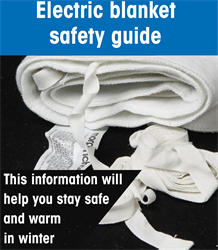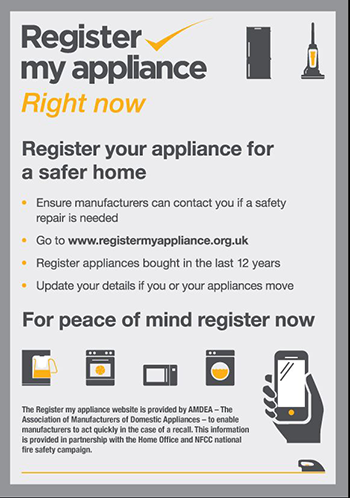Check your electrical appliances and reduce the risk of fire for your family or housemates
Electrical appliances
- Keep them dry - this includes plugs and sockets, not a good idea to put a vase of flowers on top of the TV, for example
- Switch them off at night - unless they are designed to be left on, like freezers
- Anything made of metal, or has a metallic finish or parts shouldn't go into a microwave
- Only charge items or devices when you are awake and in your home so you can react quickly if there's a problem
Keep electrical items in good working order
- Electrical appliances, especially ones that run at high speeds and contain motors, like washing machines, should be serviced once a year by a qualified electrician.
- Follow the manufacturer's instructions
Regularly run these checks over your equipment
Plugs and sockets
Keep an eye out for the following:
- Hot plugs or sockets, scorch marks, fuses that often blow, or flickering lights - they are all are signs of loose wiring or other electrical problems
- Badly wired plugs - any coloured wires sticking out could come loose and debris could also get into the plug
- Are the wires are held firmly in place inside the plug
- Overloaded sockets - plugging too many electrical appliances into one socket can lead to overheating
- Use sockets safely - it's better to use a bar adapter (multi-board) on a lead than a block adaptor
- Only use one adaptor per socket - don't plug one adaptor into another and try to keep to one plug per socket
Cables and leads
Are they
- Getting frayed and damaged - make sure the outer covering of all power leads is in good condition and replace if necessary?
- Badly positioned - they shouldn't be anywhere that they could be tripped over, or near water, cookers or other sources of heat?
- Running them under rugs or carpets where they can wear through without anyone noticing - position them elsewhere?
Fuses
When you're fitting or replacing a fuse, it's important to use the right fuse for the appliance to make sure the fuse doesn't overheat.
Check the manual or look for a sticker on the appliance to find out its wattage and then use the correct fuse:
- for appliances up to 700 watts, use a 3 amp fuse
- for appliances between 700 and 1,000 watts, use a 5 amp fuse
- for appliances more than 1,000 watts, use a 13 amp fuse
Extension leads and adapters have a limit on how many amps they can take, so be careful not to overload them, to reduce the risk of fire.
Mobile phone charging
Put safety first with this essential guide to safer mobile phone charging.
Unsafe mobile phone chargers have been blamed for a growing number of house fires in recent years. And with more than 1.8 million mobile phone chargers bought online in the UK each year, it’s easy to fall victim to fake and angerous phone chargers.
Avoid cheap chargers
Phone chargers can be bought online for as little as a £1 – far cheaper than branded counterparts. However, there’s no guarantee they meet stringent UK and EU safety standards.
Cheap phone chargers may explode once plugged into a wall socket – the result, say fire and safety experts, of cheap wiring and sub-standard components. They may also fail to charge your phone properly and even damage the phone’s battery.
Issues with universal chargers
Although many phones now use standard USB-connection chargers, avoid buying cheap universal chargers online that claims to work with a wide range of mobile phones and tablets.
Different mobile devices typically require varying levels of charge, so a single charger may cause your phone’s battery to overheat or charge less efficiently
Buy genuine chargers
Despite being more expensive, always buy an official charger for your particular phone as they’ll have been thoroughly tested and meet UK safety standards.
You’re not paying extra just for the name – you’re actually buying peace of mind.
If you must use a third-party charger, buy one from an approved, trusted brand.
Don’t cover your charger while in use
We’ve all heard stories of phones bursting into flames or exploding while being charged. Along with using a genuine charger, make sure nothing is covering your phone as it charges so that the heat generated is able to dissipate safely.
Don’t leave a charger plugged in overnight
Avoid leaving your phone charging unattended, particularly overnight.
While your phone is clever enough to stop taking a charge once the battery is full, a problem may occur if the charger itself overheats, especially if left on a flammable surface.
You’ll be less alert to a fire breaking out when asleep. Install a smoke detector and check regularly that it’s in working order.
Check the charger for damage
Frayed cable? Loose connections? Wobbly plug pins? If your phone charger looks worn or damaged, buy a new one.
Damaged chargers pose a fire risk and could electrocute if you touch an exposed part of the charger when plugging and unplugging it.
Don’t overload sockets
Don’t be tempted to plug several mobile phones and other devices into one wall socket using a multi-plug adaptor. Long strip adaptors are safer, but can take only a total of 13 amps, so don’t overload them either.
- They should be kept away from furniture and fittings. Make sure that nothing can fall onto a heater.
- Keep at least three feet - one metre - away from them
- Have fireguards to prevent and protect children and/or pets coming in contact with them
- Never dry washing on or near them (or on fireguards)
- Try to secure heaters up against a wall to stop them falling over.
- Don't cover air vents on storage heaters or fan heaters.
Choosing your electric blanket

- Buy your electric from a reliable source
- Always buy new when choosing an electric blanket - secondhand blankets may not be safe and you can't be sure they meet current safety requirements.
- Check that it has a UK safety standard mark, this means that is has been independently tested and meets UK and European safety standards.
Look for these safety marks

Using your electric blanket
- Always read and follow the manufacturer's instructions before use
- Never use an electric underblanket as an overblanket (or vice versa)
- Don't use the blanket while it's still folded or creased
- Don't use a hot water bottle at the same time as using your electric blanket
- Don't touch the blanket if you have wet hands or feet, and never use the blanket if it's wet or damp
- Don't insert or use pins to hold the blanket in place on the bed
Check your blanket regularly for signs of wear or damage
- Are there any scorch marks or discoloured areas on the fabric of the blanket?
- Are wires visible or poking through the fabric?
- Is the fabric is frayed or worn?
- Is there any damage to the power cable between the plug and the blanket's control or between the control and the blanket?
- Does the control make a buzzing sound when switched on or gives off a scorching smell?
- Is the blanket's connector - where the electrical cable plugs into the blanket - damaged or over-heating?
If you're in any doubt about your blanket, contact the manufacturer before you use it to make sure that it is safe. It may need to be replaced.
Storing your electric blanket
Even when your blanket is not in use, you can leave it on the bed all year round or place it flat on a spare bed.
If you put the blanket away, it should be stored as the manufacturer recommends or as follows:
- Let it cool down before folding
- Loosely fold or roll it in a towel or plastic bag and store it in a cool dry place
- Don't use any moth-proofing like moth balls
- Don't place heavy items on it while it is being stored
These batteries are in common use and should always be charged with the manufacturer’s approved charger. Using a cheaper or alternative charger may result in the wrong charge being applied which can result in them catching fire.
There have been a number of serious and fatal fires nationally caused by e-Bike batteries being incorrectly charged. These create a particular risk to occupants as they are often stored in the means of escape – next to exit doors. Similar risks relate to charging mobility scooters.
Our advice is to only use approved charging devices, not to charge them overnight and disconnect one charging is complete.
More about Lithium Batteries and e-scooters
Please ensure you dispose of batteries correctly and safely: Consumer products: recycling batteries and electrical waste - GOV.UK
Lithium Ion batteries have been known to cause serious fires at waste plants.

